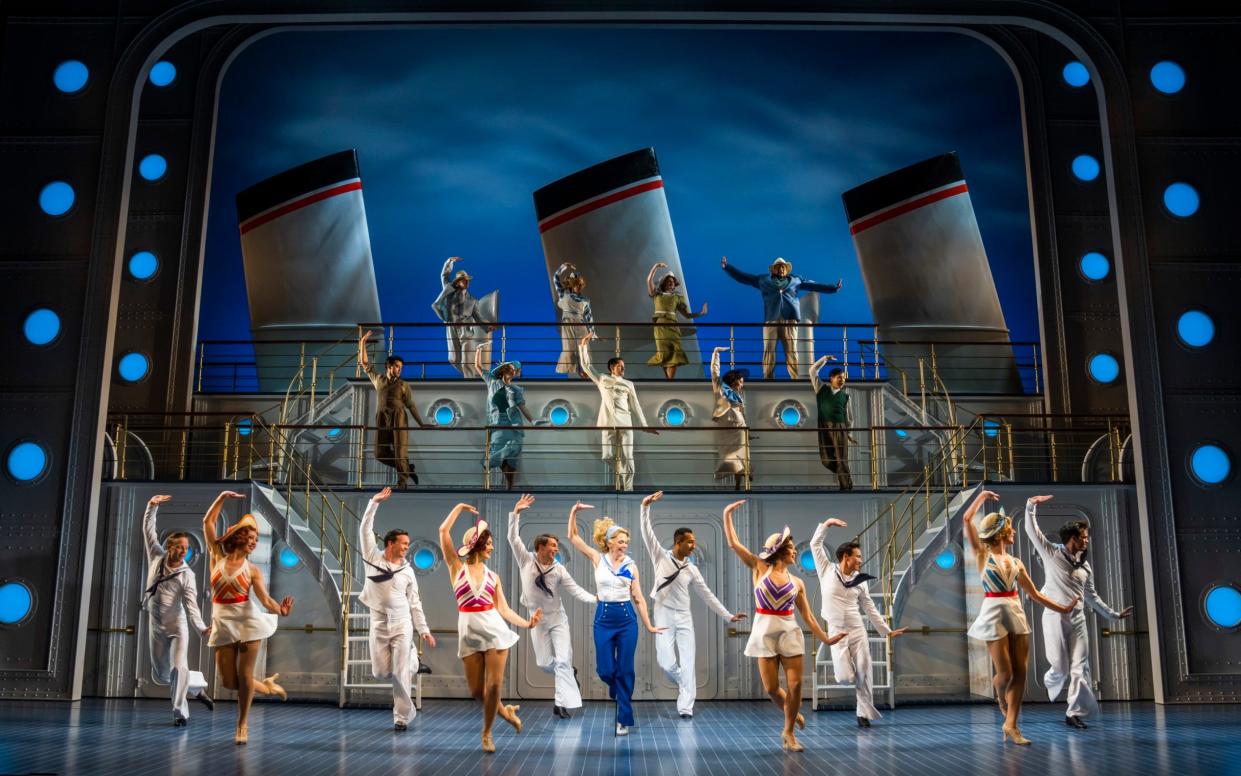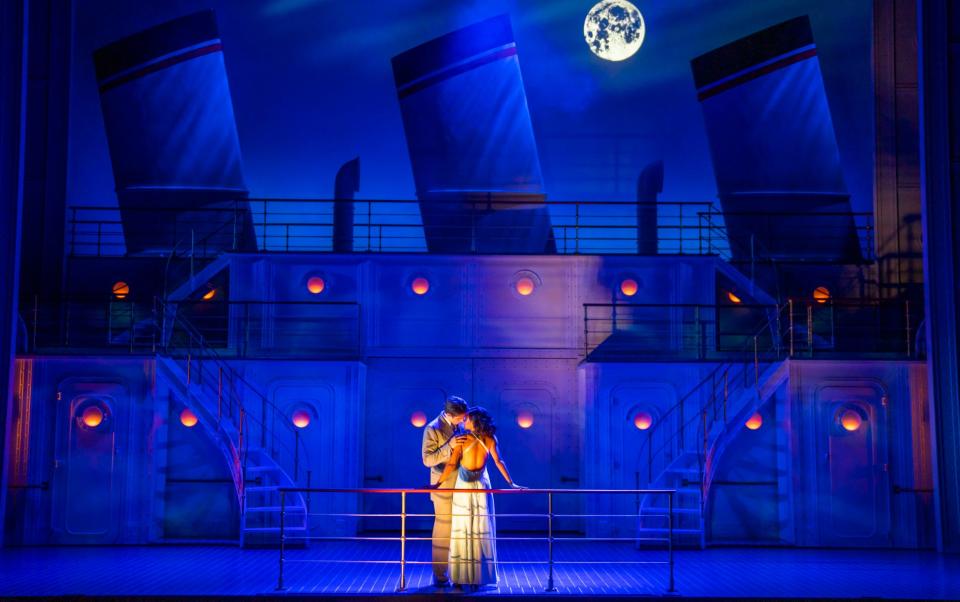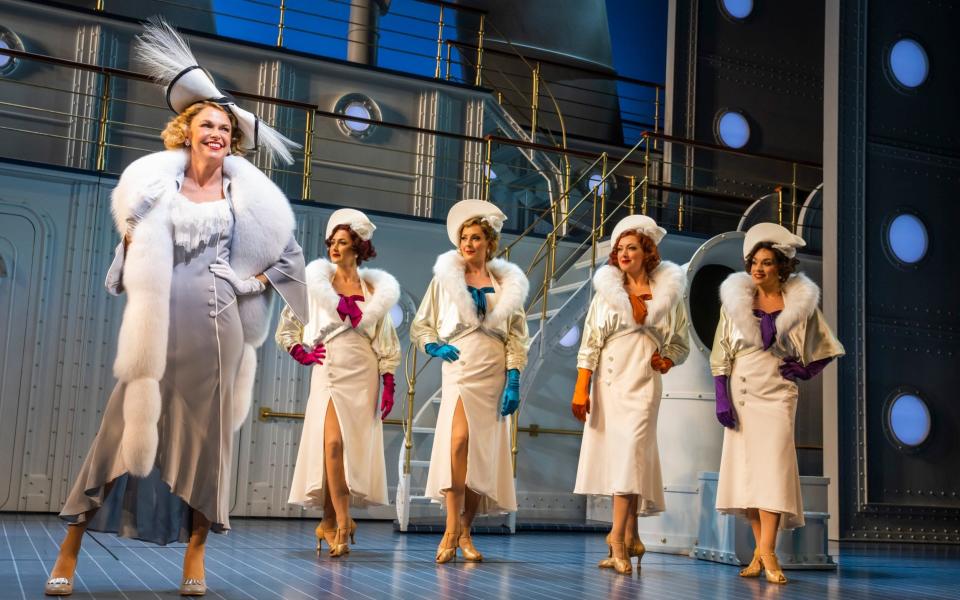Anything Goes, review: a show that will make you gasp in wonder and laugh till it hurts

- Oops!Something went wrong.Please try again later.
At the climax of this utterly joyful musical, one that made us feel, for the first time in many months, that all was right with the world, my mother turned to me with happy tears in her eyes and said, “Well, that’s the show of the year.” And she’s absolutely right. I would give it six stars if I could.
Kathleen Marshall’s deliriously, defiantly, de-lovely production immediately joins the pantheon of great classic musical revivals such as the National Theatre’s 1998 Oklahoma! – pure class, and pure joie de vivre. This Anything Goes doesn’t just charm with Cole Porter gems such as You’re the Top and I Get a Kick Out of You, or make you laugh till it hurts, or gasp in wonder at the epic ensemble production numbers that start huge and keep getting bigger and better. It has a restorative effect that takes you beyond being an appreciative audience member: it makes you feel kinder towards your fellow man. It cures the soul.
And hallelujah! Marshall has a sinfully talented leading lady in Sutton Foster, who won a Tony Award when she starred in this production 10 years ago on Broadway. She plays the nightclub singer Reno Sweeney, whose act is a sexy spin on the religious revival meeting. And by the end of the blistering Blow, Gabriel, Blow, we’re all converts, stopping the show with rapturous applause, cheers and hollers that seem to amaze even Foster.
The title number gets the same uproarious response, and no wonder. Foster, now 46, is still a dazzling triple threat. She follows up several minutes of non-stop tap, spins and lifts by belting out the song’s climax, each note clear as a bell – and makes it look easy.
Rather less slick is the chaotic plot, originally scripted by PG Wodehouse and Guy Bolton, rewritten by Howard Lindsay and Russel Crouse for the 1934 opening, then again by Crouse’s son in 1987. It sees Wall Street broker Billy Crocker defy his boss and stow away on a luxury ocean liner, sailing from New York to London, to pursue debutante Hope Harcourt. Also on board is Reno, who has unrequited feelings for Billy; Hope’s English aristocrat fiancé; and gangster Moonface Martin, disguised as a priest.

But it’s really all an excuse for a riot of daft gags, slapstick and romantic hijinks. Director/choreographer Marshall understands that screwball comedy works best at speed, and her production more than delivers. Foster gets a cracking partner-in-crime with Robert Lindsay’s Moonface, and in the clowning Friendship, they literally fight for the spotlight – until Lindsay snatches victory with a fourth wall-breaking ad lib.
He hams it up marvellously here, from the “New Yoik” mobster growl, which makes it sound like he’s swallowed Tony Soprano, to the music hall skits – including a wildly silly scene where he hides a yapping dog down his trousers. At this point, one person in my row actually howled.
Felicity Kendal acquits herself well in her first ever musical, contributing a funny supporting turn as Hope’s hysteria-prone mother. She’s wooed by Crocker’s boss (a game Gary Wilmot), who is permanently soused. Superb, too, are Carly Mercedes Dyer as a sexually voracious moll and Haydn Oakley as the malapropism-prone lord with a startling secret.

One dubious plot point is made more confounding by Foster’s sheer charisma: why would Billy want the priggish Hope – a sweet-voiced but contained Nicole-Lily Baisden – instead of Reno? Marshall solves the problem through dance: when Baisden and Samuel Edwards’ impulsive Billy move as one in the Fred and Ginger-styled It’s De-Lovely, bathed in a pink sunset, they win your heart.
Jon Morrell supplies delectable costumes, from slinky gowns to crisp sailor suits, and Derek McLane a gleaming, multi-level boat set with Art Deco cabins that beautifully frames Marshall’s Busby Berkeley-esque formations. A full orchestra under Stephen Ridley gives a buoyant account of Porter’s score.
There are some resonant elements, like panting celebrity worship and a bleak backdrop (sub the Great Depression for Covid), but really this is escapism of the highest order. All aboard!
Until 31 October. To book tickets, please visit Telegraph Tickets

